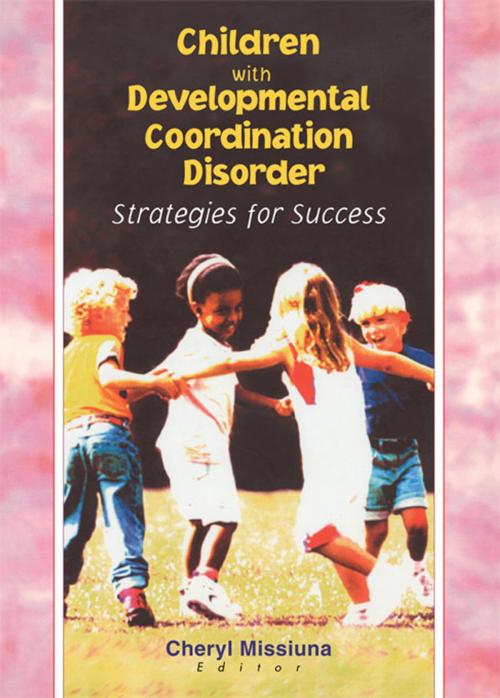Children with Developmental Coordination Disorder
Strategies for Success
Nonfiction, Family & Relationships, Parenting, Child Development, Health & Well Being, Medical, Allied Health Services| Author: | ISBN: | 9781136394751 | |
| Publisher: | Taylor and Francis | Publication: | May 13, 2013 |
| Imprint: | Routledge | Language: | English |
| Author: | |
| ISBN: | 9781136394751 |
| Publisher: | Taylor and Francis |
| Publication: | May 13, 2013 |
| Imprint: | Routledge |
| Language: | English |
Take a cognitive approach to treating children with DCD!
Developmental coordination disorder (DCD) is frustrating for the children who must deal with it every day, for their parents, and for the professionals who work with these children. Children with Developmental Coordination Disorder offers new hope to children who are exeriencing this distinctive movement skill syndrome. It suggests ways they can overcome the challenges they encounter wherever motor skills are needed: in the classroom, on the playground, and at home doing self-care.
This groundbreaking volume challenges pediatric therapists to examine the assessment and intervention approaches that are currently being used with children who have DCD. Children with Developmental Coordination Disorder offers new model that draws on research in the fields of motor learning, educational psychology, cognitive strategies, and occupational therapy. In addition to theoretical background, this book provides a detailed protocol for CO-OP (Cognitive Orientation to Daily Occupational Performance), an intervention that has been shown to facilitate problem-solving and enhance motor skill acquisition for children with DCD.
Children with Developmental Coordination Disorder offers a comprehensive discussion of the disorder, including:
-
identification and assessment of children with DCD
-
analysis of the Bruininks Osortesky Test of Motor Proficiency and the Movement Assessment Battery for Children
-
the theoretical and empirical basis for current treatment approaches
-
new motor learning theories and their implications for treatment
-
the systematic development and evaluation of the CO-OP approach, from early case studies through videotape analysis and retrospective chart review
Based on six years of systematic, cooperative research, Children with Developmental Coordination Disorder demonstrates the success of a unique cognitive approach to intervention with these frustrated children.
Take a cognitive approach to treating children with DCD!
Developmental coordination disorder (DCD) is frustrating for the children who must deal with it every day, for their parents, and for the professionals who work with these children. Children with Developmental Coordination Disorder offers new hope to children who are exeriencing this distinctive movement skill syndrome. It suggests ways they can overcome the challenges they encounter wherever motor skills are needed: in the classroom, on the playground, and at home doing self-care.
This groundbreaking volume challenges pediatric therapists to examine the assessment and intervention approaches that are currently being used with children who have DCD. Children with Developmental Coordination Disorder offers new model that draws on research in the fields of motor learning, educational psychology, cognitive strategies, and occupational therapy. In addition to theoretical background, this book provides a detailed protocol for CO-OP (Cognitive Orientation to Daily Occupational Performance), an intervention that has been shown to facilitate problem-solving and enhance motor skill acquisition for children with DCD.
Children with Developmental Coordination Disorder offers a comprehensive discussion of the disorder, including:
-
identification and assessment of children with DCD
-
analysis of the Bruininks Osortesky Test of Motor Proficiency and the Movement Assessment Battery for Children
-
the theoretical and empirical basis for current treatment approaches
-
new motor learning theories and their implications for treatment
-
the systematic development and evaluation of the CO-OP approach, from early case studies through videotape analysis and retrospective chart review
Based on six years of systematic, cooperative research, Children with Developmental Coordination Disorder demonstrates the success of a unique cognitive approach to intervention with these frustrated children.















